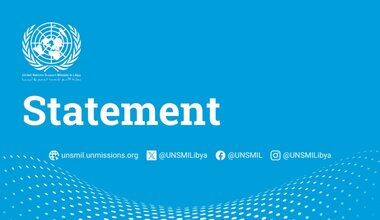Statement of the Special Representative of the Secretary-General for Libya on the Occasion of the International Day of the Victims of Enforced Disappearances
“Alarming Levels of Enforced Disappearances Across Libya Threaten National Reconciliation”
TRIPOLI - On the International Day of the Victims of Enforced Disappearances, the United Nations Support Mission in Libya (UNSMIL) expresses its alarm at the pervasive and systematic practice of enforced disappearances across the country.
UNSMIL is gravely concerned about the continued targeting of political actors and perceived opponents, journalists, human rights defenders, activists, state officials, and ordinary citizens.
The persistence of incommunicado detention, the existence of unofficial detention facilities where torture and ill-treatment are widespread, and the routine denial of due process feed into this grave pattern. Two members of the House of Representatives remain missing to this day. In May, mass graves and unidentified remains were uncovered in Tripoli, including within former detention facilities, exposing the systematic nature of enforced disappearances. Such crimes create a climate of fear that stifles civic space, entrenches impunity, and undermines the conditions necessary for peace, credible elections, and national reconciliation.
Efforts to uncover the truth and ensure accountability for these violations are essential to rebuild trust in national institutions and to foster a conducive environment for the political process in line with the Political Roadmap presented to the Security Council on 21 August.
On this day, UNSMIL stands in solidarity with the families of the disappeared, civil society, and human rights defenders. The Mission calls on all Libyan authorities to:
- End enforced disappearances and arbitrary detention, including by signing and ratifying the International Convention for the Protection of All Persons from Enforced Disappearance and the Optional Protocol to the Convention Against Torture.
- Disclose the fate and whereabouts of all missing persons by establishing a National Commission for the Missing and a National Prevention Mechanism, each with a clear mandate consistent with international standards and Libyan law.
- Ensure accountability for perpetrators, including through cooperation with the International Criminal Court and United Nations mechanisms, and provide victims and their families with reparations, compensation, psychosocial support, and memorialisation.
- Adopt comprehensive transitional justice measures, including a consensual law to address enforced disappearances and arbitrary detention as part of broader efforts to redress past violations.
A year ago, UNSMIL and OHCHR published a report on crimes in Tarhuna, documenting killings, enforced disappearances, sexual violence, torture, and abductions committed by armed groups that benefited from the complicity of state institutions. While the International Criminal Court (ICC) has issued six arrest warrants and the Attorney-General has taken steps to arrest and detain suspects, accountability remains limited. UNSMIL urges all States to cooperate with the Court to bring remaining fugitives to justice.
Stalled excavations of mass graves in and around Tarhuna for nearly two years have denied families their right to truth. To this day, 67 individuals remain missing. Families continue to demand answers, justice, and reparations. Their voices must be heard—not only in Tarhuna, but also in Murzuq, where more than 40 people abducted in 2019 remain missing, an open wound for an entire community still seeking answers and preventing local reconciliation efforts. Similarly, in Tawergha and Misrata, families still await news of loved ones from the revolution; and in Sirte, where disappearances are regularly reported as well as many other locations across Libya, scarred by a long legacy of violations, including the Abu Salim massacre of 1996.
This tragic reality highlights the urgent need for a coordinated national effort to clarify the fate of all missing persons as part of a wider transitional justice process. UNSMIL and UNDP, with the support of the Netherlands, are currently implementing a three-year programme to strengthen forensic capacities, advance a draft law on missing persons, support the formation of a National Network of civil society organizations, engage families, and expand psychosocial, legal, and public awareness initiatives, including through the nationwide media campaign, Mafqood.
UNSMIL reaffirms its commitment to working with all Libyan stakeholders to strengthen the rule of law, uphold human rights, and ensure accountability for all violations, including enforced disappearances. The Mission calls on the authorities to take urgent action—through legislative reform and the establishment of a National Commission for the Missing—to address this painful legacy and to bring justice to the countless families and communities across Libya who continue to wait for answers.
 United Nations Peacekeeping
United Nations Peacekeeping UN
UN









